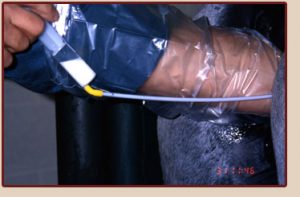Embryo Transfer
The technique of passing an embryo from one mare (donor) into another (recipient) has become a viable service for so many reasons. Most commonly, horse owners use this procedure for older, genetically superior mares that no longer have the uterine competency to maintain a pregnancy. By transferring an embryo into a younger, reproductively sound mare, this gives a means of continuing with an older mare’s breeding career. Owners of competition mares also find an embryo transfer program quite advantageous. This service allows a mare to continue showing and performing while still having one or more offspring every year.
Read More About Embryo Transfer | Affiliated Embryo Recovery Program – For Veterinarians

Reproductive Evaluations
A mare reproductive evaluation has some very important applications. If someone is purchasing a mare with the intent of breeding her at some point, it would be wise to have a full reproductive evaluation done prior to purchase. It is not uncommon for mares to have underlying issues that were previously undetected. An evaluation is certainly recommended whenever trauma or injury has occurred to the reproductive tract. Quite often, injuries arise during the foaling process. A timely evaluation post-foaling will assess the damage so corrections can be made to preserve future pregnancies. If a mare has any history of fertility problems, a full evaluation may detect a reason for the subfertility and help to better understand the chances of her ever getting in foal and maintaining a pregnancy. In an attempt to recognize potential complications, many breeders elect to have a reproductive evaluation done prior to the breeding season. Certain management schemes can be put in place to help sustain a pregnancy if issues are detected early.
The mare reproductive evaluation at ERC includes an examination of the perineal (vulvar) region; palpation and ultrasonography of the reproductive tract, vaginal speculum examination, and culture, cytology and biopsy of the uterus. Shortly after the results are compiled, a full report is provided to the mare owner describing the findings and making recommendations with regard to treatment, breeding procedures, and suitability of the mare for breeding.

Artificial Insemination
Artificial insemination has become common place in the industry today however the breeding process can still be rather intimidating to many horse owners. We at ERC offer a program to help alleviate the mare owner from the worries of breeding. Once a mare is dropped off at our facility, she is reproductively managed in a manner that optimizes her chances of getting in foal. Evaluation of follicle growth, determination of appropriate breeding time, ordering, evaluation and insemination of semen, and assessment of any potential complications are all part of the comprehensive management package.
It is well known that frozen semen has a shorter lifespan in the mare’s reproductive tract when compared to fresh or cooled semen. Because of this, it is essential for frozen semen to be inseminated as close to ovulation as possible. To optimize pregnancy rates, mares should be examined for follicle development several times throughout the day and night. As one could imagine, this becomes very impractical for most veterinarians. The management program at ERC allows mares to be ultrasounded at least 4 times per day. A flat fee is put in place for this service to allow examinations to occur as frequently as needed without burdening the mare owner with rising costs. The result is more accurate prediction of ovulation and time for insemination. The success of this management practice is evident as every year our pregnancy rates with frozen semen meet or exceed industry wide standards.

Subfertility Management
Each breeding season, there are a number of mares that come to ERC for specialty management. These mares typically have a history of abortion, early embryonic death or failure to conceive. A thorough diagnostic evaluation may initially be warranted in order to determine the possible cause(s) of subfertility. The best chances for a sustained pregnancy may only come when these mares undergo very detailed management practices. Routine ultrasound examinations are very important when assessing ovarian or uterine characteristics. Close attention is paid to follicle growth patterns, impending ovulation, uterine edema, cysts, fluid retention within the uterus and insemination frequency and volume. Management of these mares may include minimizing inseminations, performing uterine infusions and lavages, and administering hormonal treatment. The experience, technology and personnel at ERC has established a management program to help with the special needs of breeding operations.

CEM Quarantine Testing
Similar to stallions, mares that are imported into the U.S. as 2 year olds or older will have to undergo testing for Contagious Equine Metritis (CEM). ERC has been approved to perform CEM quarantine testing on stallions and mares. Non-pregnant and pregnant mares need to endure 14-17 days of teasing which includes blood testing (pregnant mares), as well as multiple cultures of the clitoral fossa and sinuses, endometrium of the uterus (non-pregnant mares) and cervix. After culturing is complete, the external genitalia, vaginal vestibule, fossa and clitoral areas are all washed with chlorhexidine scrub and packed with nitrofurazone ointment for 5 consecutive days.

Foaling Services
For those mare owners looking for help, we offer a service whereby experienced staff are on-site 24 hours a day to attend and, if necessary, assist in the foaling process. To aid in identifying the exact time of foaling, we have incorporated the foalert system into our management scheme. Simply, a small transmitter is sutured to the vulvar lips of the foaling mare. As the foal passes through the birth canal, two parts of the transmitter separate thus sending a radio signal to a nearby receiver. This in turn emits a loud beeping sound which is heard by the attendant staying in the apartment above the clinic. This scheme has been in use at ERC for years making it possible for us to offer professional foaling services.
